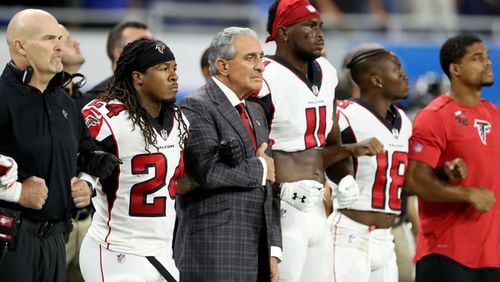The NFL and National Football League Players Association have agreed to halt enforcement of rules regarding the new national anthem policy while the two sides work on a resolution.
The league and its players union issued a joint statement late Thursday, hours after The Associated Press reported that Miami Dolphins players who protest on the field during the anthem could be suspended for up to four games under a team policy issued this week.
The NFL's biggest game, the Super Bowl, will be played in Atlanta this season on Feb. 3, 2019 in Mercedes-Benz Stadium. The Falcons open the regular season on Sept. 6 in a nationally televised road game against the Super Bowl champion Philadelphia Eagles.
"The NFL and NFLPA, through recent discussions, have been working on a resolution to the anthem issue. In order to allow this constructive dialogue to continue, we have come to a standstill agreement on the NFLPA's grievance and on the NFL's anthem policy. No new rules relating to the anthem will be issued or enforced for the next several weeks while these confidential discussions are ongoing," the statement read.
Miami's nine-page discipline document included a one-sentence section on "Proper Anthem Conduct" and was provided to the AP by a person familiar with the policy who insisted on anonymity because the document is not public. It classifies anthem protests under a large list of "conduct detrimental to the club," all of which could lead to a paid or unpaid suspension, a fine or both.
The Dolphins said in a statement: "The NFL required each team to submit their rules regarding the anthem before their players reported to training camp. We will address this issue once the season starts. All options are still open."
Miami can choose not to issue any suspension nor fine any player guilty of "conduct detrimental to the club." Other violations under that label include drug use or possession, gambling, breaking curfew and riding motorcycles as a driver or passenger from the start of camp until the last game of the season.
The team's rookies reported on Wednesday.
Dolphins veteran receiver Kenny Stills took a knee with a hand on his heart during the anthem throughout last season. Defensive tackle Jordan Phillips put his arm around Stills before one game. Two other players who knelt — safety Michael Thomas and tight end Julius Thomas — are no longer with the team.
Defensive end Robert Quinn, who raised his fist during the anthem while with the Rams, is now with the Dolphins.
Miami's anthem policy came after the NFL decided in May that teams would be fined if players didn't stand during "The Star-Spangled Banner" while on the field. The league left it up to teams on how to punish players. None of the team policies had been made public.
Jets acting owner Christopher Johnson said shortly after the league announced its policy that he will not punish his players for any peaceful protests — and would pay any potential fines incurred by the team as a result of his players' actions.
The NFL rule that was passed in May forbid players from sitting or taking a knee if they are on the field or sidelines during the national anthem, but allowed them to stay in the locker room if they wish. The new league rules were challenged this month in a grievance by the players union.
"Players who are on the field during the Anthem performance must stand and show respect for the flag and the Anthem," says the 16th and final bullet point on Miami's list of conduct considered detrimental, below disparaging teammates, coaches or officials including NFL Commissioner Roger Goodell.
The NFLPA said earlier this month that the NFL policy, which the league imposed without consultation with the players union, is inconsistent with the collective bargaining agreement and infringes on player rights.
The Associated Press contributed to this article.
About the Author






